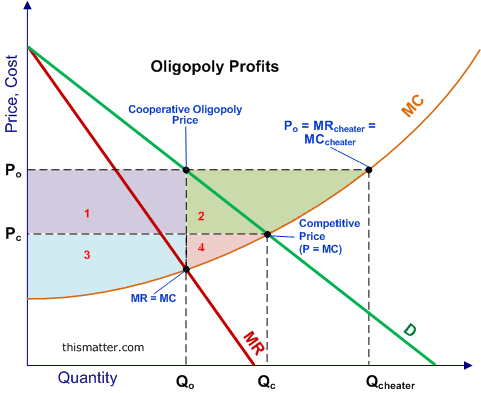Roger_Murdock
Active Member
From that Konrad Graf article:
But even if we think that's what's going on, i.e., that the miners have formed a cartel, they don't appear to be acting like one -- or at least, not a very bright one. You don't form a cartel and then just arbitrarily restrict industry output. I mean, OPEC doesn't go, "hey guys, let's only sell one barrel of oil this year. If we do that, that one barrel will fetch a fortune!" You restrict quantity to the point that maximizes profits (i.e., the point at which marginal cost equals marginal revenue).

Somehow I doubt that 1-MB is the magic number that allows miners to enjoy maximum monopoly profits from transaction fees. In fact, most of us seem to think that the real motivation behind the ceiling is the desire to maximize the profits associated with products that will compete with the miners' products (i.e., off-chain transaction services). So the current situation seems kind of like OPEC having been convinced to cap their oil production at an absurdly-low and profit-sacrificing level ... by a company that sells electric cars.
I was thinking more about this idea of the miners as a "cartel." So it does seem as though Bitcoin's nature makes it at least relatively easy for miners to impose an "industrywide output ceiling" on on-chain transaction-inclusion services (i.e., blockspace). Unlike the situation with a traditional cartel, you can impose this ceiling without the willing participation of all or substantially all firms in the market (instead you just need a simple majority of the hashpower), and, because of the public nature of the blockchain, you don't have to worry about secret cheating.The two cases are clearly separate under legal theory, but not nearly so much under economic analysis. Government action to impose an output ceiling can only succeed through the threat or actual implementation of officially sanctioned violence against any would-be innocent resisters. In contrast, Bitcoin participation remains wholly voluntary regardless of this or that setting within the code. At the economic analysis level, however, the results of a production ceiling are the same regardless of its source and implementation method.
This case also fails to fit the (mythical) model of a stable free market cartel. Such theoretical arrangements are naturally unstable. Absent legal enforcement, any participant can gain by dropping out and exceeding the ceiling. Any new entrant can start producing without ever joining the cartel. In the current case, however, no particular renegade or newcomer alone can make a hard fork happen so as to break the output ceiling.
So the situation, although certainly novel, remains economically closest to a legally enforced industrywide output ceiling. One implication of this, while fascinating, is not especially encouraging: Not only has Bitcoin demonstrated that some good things that many had considered impossible without government are indeed possible—namely the production of money—it is also threatening to show that some bad things some had considered impossible without government could indeed be possible—namely, successful imposition of a cartel-style industrywide output ceiling.
But even if we think that's what's going on, i.e., that the miners have formed a cartel, they don't appear to be acting like one -- or at least, not a very bright one. You don't form a cartel and then just arbitrarily restrict industry output. I mean, OPEC doesn't go, "hey guys, let's only sell one barrel of oil this year. If we do that, that one barrel will fetch a fortune!" You restrict quantity to the point that maximizes profits (i.e., the point at which marginal cost equals marginal revenue).

Somehow I doubt that 1-MB is the magic number that allows miners to enjoy maximum monopoly profits from transaction fees. In fact, most of us seem to think that the real motivation behind the ceiling is the desire to maximize the profits associated with products that will compete with the miners' products (i.e., off-chain transaction services). So the current situation seems kind of like OPEC having been convinced to cap their oil production at an absurdly-low and profit-sacrificing level ... by a company that sells electric cars.
Last edited:

